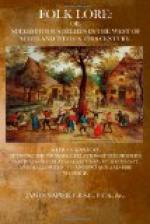CHAPTER III.
MARRIAGE.
The next very important event in man’s life is marriage, and naturally, therefore, to this event there attached a multitude of superstitious notions and practices, many of which, indeed, do still exist. The time when marriage took place was of considerable importance. One very prevalent superstition, common alike to all classes in the community, and whose force is not yet spent, was the belief that it was unlucky to marry in the month of May. The aversion to marrying in May finds expression in the very ancient and well-known proverb, “Marry in May, rue for aye,” and thousands still avoid marrying in this month who can render no more solid reason for their aversion than the authority of this old proverb. But in former times there were reasons given, varying, however, in different localities. Some of the reasons given were the following:—That parties so marrying would be childless, or, if they had children, that the first-born would be an idiot, or have some physical deformity; or that the married couple would not lead a happy life, and would soon tire of each other’s society. The origin of this superstition is to be found in ancient heathen religious beliefs and practices. We have already noticed the ancient belief that the spirits of dead ancestors haunted the living, and I have given a formula whereby a single person could exorcise the ghosts of his departed relatives, and I have also mentioned that national festivals to propitiate the spirits of the dead were appointed by some nations. Now, we find that among the Romans this national festival was held during the month of May, and during its continuance all other forms of worship were suspended, and the temples shut; and further, for any couple to contract marriage during this season was held to be a daring of the Fates which few were found hardy enough to venture. Ovid says—




